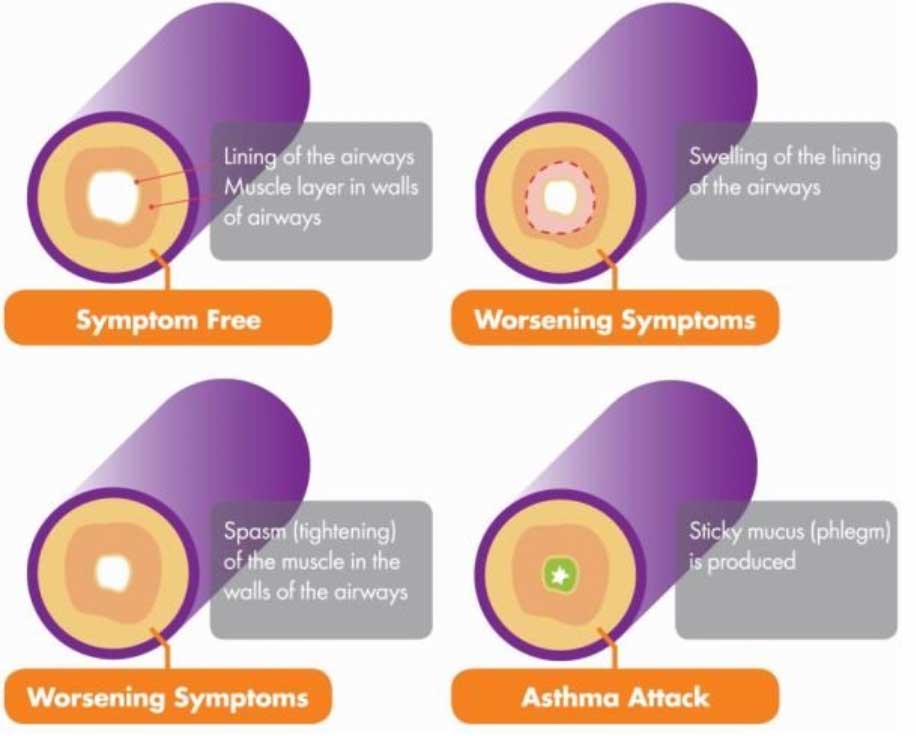Asthma is a common long-term inflammatory disease of the airways of the lungs. It is characterized by variable and recurring symptoms, reversible airflow obstruction, and bronchospasm. Symptoms include episodes of wheezing, coughing, chest tightness, and shortness of breath. These episodes may occur a few times a day or a few times per week. Depending on the person, they may become worse at night or with exercise.
What is Asthma?
What caused Asthma?

We still don’t know the exact cause of asthma, but we do know that:
- Anyone can develop asthma but it is particularly common in Ireland, where over 470,000 adults and children have the condition.
- Asthma often begins in childhood but it can start at any age.
- Asthma runs in families e.g. if you have parents or brother and sisters with asthma then you are more likely to have it yourself.
- If you or your family members have hay fever or eczema you are more likely to develop asthma.
- Adult onset asthma can develop after a respiratory tract infection (colds, flu, chest infections).
- It’s thought that modern changes to housing, diet and cleanliness may have contributed to the rise in asthma over the last few decades
- Asthma is not infectious.
- Smoking during pregnancy or exposing a child to tobacco smoke will increase their risk of developing asthma.
- Being overweight increases the risk of developing asthma.
- Some children lose their symptoms as they grow older but asthma is a chronic disease so it never goes away and symptoms can come back later in life.
How is Asthma Diagnosis?
Your doctor will confirm a diagnosis of Asthma following a detailed subjective history concerning the presentation of past symptoms, response to therapy over time and Asthmatic episodes. Some tests, such as an exercise challenge and spirometry may be useful in determining the severity of the Asthma. Whereas allergy testing can be useful in identifying specific asthmatic episode triggers to avoid. Asthma is classified according to the frequency of symptoms, forced expiratory volume in one second (FEV1), and peak expiratory flow rate.
You may be referred to a physiotherapist for advice and training on controlled breathing techniques, lung clearance exercises and developing progressive exercise tolerance.
Managing your Asthma

Asthma cannot be cured, but with proper treatment it can be well-managed. The whole aim of managing asthma is to put you in control of your asthma, rather than letting asthma control you.
Asthma is generally managed through a combination of controller medication and reliever medication. There is no reason why everyone with asthma cannot live a full and active life, symptom free.
Physiotherapy treatment for Asthma
At Respiratory Physiotherapy Ireland, our physiotherapists will ensure you specialised and personalised treatment on your presentation of asthma. Depending on the severity of your condition your treatment may involve;
- Breathing technique retraining:
- Controlling respiratory rate
- Diaphragmatic breathing
- Relaxation breathing exercises
- Physical conditioning / exercise tolerance:
- Benefits of exercise / addressing fear avoidance.
- Developing appropriate exercise program.
- Improve exercise tolerance / reduce breathlessness.
- Improve general health and quality of life.
- Secretion clearance:
- Effective / productive coughing techniques.
- Postural drainage in sitting and lying.
- Manual assistance, including percussion, vibrations and shaking.
- Education and Advice:
- Disease cause and progression.
- Effects of environmental and allergen factors.
- Medication management
- Recognising signs of asthmatic episodes.
Asthma Attacks

Asthma cannot be cured, but with proper treatment it can be well-managed. The whole aim of managing asthma is to put you in control of your asthma, rather than letting asthma control you.
Asthma is generally managed through a combination of controller medication and reliever medication. There is no reason why everyone with asthma cannot live a full and active life, symptom free.
Summary
Asthma can cause anxiety about how to react in the event of an asthmatic episode. There can be a tendency to avoid any situations that may exacerbate the condition, leading to a reduction in quality of life. Our physiotherapists will help you achieve your physical potential and educate you about your condition, relieving anxiety. Properly managed, the affects and limitations of asthma can be largely mitigated, allowing you to pursue normal activities and enjoy a better quality of life.
